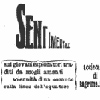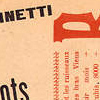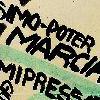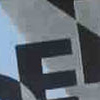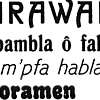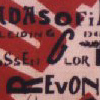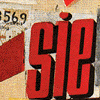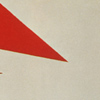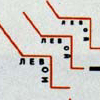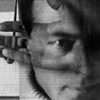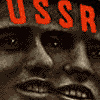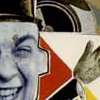Futurism
was launched by italian poet Filippo Marinetti on 1909.
Through unconventional typography
and layout, Italian Futurist writing marries poetic content, visual form,
and aural impression to create a multisensory experience.
Filippo
Marinetti
"CHAIRrrrrrrRR," also titled "Lettre d'une jolie
femme a monsieur passeiste", serves as the cover for the mini-anthology
of Marinetti's collected writings and typographic experiments published
in French in 1919 as "Les mots en liberté futuristes"
(Futurist words in liberty). Mixing majuscules and minuscules in a variety
of weights and fonts printed in red up the side of the page, the typography
expresses the sardonic meaning of the poem sex for sale hypocritically
presented as love.
1914
Fortunato
Depero
Marcialottare
1916
Free-word composition letter addressed to Marinetti
Fortunato
Depero
While most of his fellow Futurists identified themselves as poets or painters,
Fortunato Depero actively pursued a career as a commercial designer. This
piece is an ode to the twentieth century.
Magazine cover
1929
Fortunato
Depero.
New futurist theatre company poster
1924
Hugo
BAll,
Dada Poem
Dada, dedicated to destroying the status quo, arose in Zurich in 1916
and then in New York, Berlin, and Paris, reacting against the absurdity
and horror of World War I.
Sound and sight poems such as this expressed the dadaist desire to replace
human's logical nonsense with ans illogical nonsense.
1917
Kurt
Schwitters & Theo Van Doesburg:
Kleine Dada Soirée
1922
Kurt
Schwitters
"Blauer Vogel"
1922
El
Lissisky
'Beat the Whites with the Red Wedge' Russia,
1919 / 1920.
The 'Red Wedge' signifies New Red Force fighting Old, Tsarists/Whites.
El
Lissitzky
Spread for the poem 'Levyi Marsh' by Mayakvosky
1923
El
Lissitzky
'The
Constructor' self-portrait photomontage
1924
El
Lissitzky
Russian Exhibition
Lithograph
1929
Solomon
Telingater
Vytiazhka (Stretching)
Collage, USSR, 1920s
